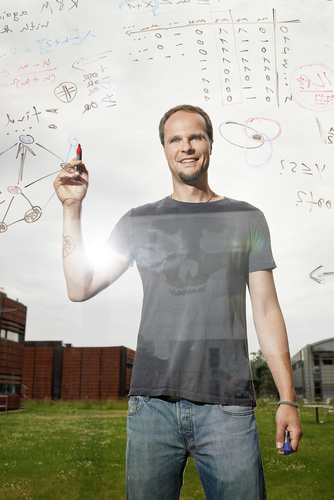
New research project to learn about life from big data
Associate Professor Jan Baumbach, Department of Mathematics and Computer Science, has received 6,400,000 DKK for Villum Foundation's Young Investigator Programme.

When you try to understand how the human body is constructed and functions, it is necessary to understand the individual building blocks such as cells, DNA and proteins. But this is not enough; it is equally important to understand how the individual building blocks influence and regulate each other through biochemical signaling.
This research field is called systems biology, and it is a field of research that often generates data sets of immense size.
Associate Professor Jan Baumbach has received a grant of 6,4 million DKK from the Villum Foundation Young Investigator Programme to develop new computational methods to process these huge data sets. The project title is “Big Data Bioinformatics".
The goal is to develop new algorithms that can process the data and identify which signaling systems are responsible for regulating of cell, tissues and organ development but also how diseases like cancer emerge.
We don't fully understand nature
"Basically, it is about understanding nature. The whole is greater than the sum of its parts. In this case, much much greater, as we need to consider a putative interplay of all possible combinations of the parts. This is how biochemical signaling drives a cell to become a skin cell or a brain cell - or how it becomes a cancer cell or how a bacterium develops resistencies. To even dream of analyzing this massive search space sufficiently to understand life, we need to explore completely novel computer science paradigms” explains Dr. Baumbach, adding:
And this is what we will do with the Big Data in Bioinformatics project at SDU.”
New SDU programme in Computational Biomedicine
The Baumbach research group is organizing the new and unique MSc programme in Computational Biomedicine at SDU. The programme is aimed at students who want to use computers to make a difference in how we treat infections or cancer patients in the future; and understand how life evolves and adopts to changing conditions.
Data is not knowledge
With his background in computer science Dr. Baumbach is primarily concerned with meeting the challenges that modern data generation technology expose us to, from DNA sequencing to mass spectrometry.
"The methods I will develop in this project will not only be useful for understanding biology. They may also be used by other researchers to understand social networks or to predict outbreaks”, says Dr. Baumbach.
He points out that it is a great advantage to run the project at the University of Southern Denmark, as it hosts Denmark's most powerful computer, ABACUS 2.0.
"Given the direct access to such compute power puts us in an excellent position to embark on this project."